Table of Contents
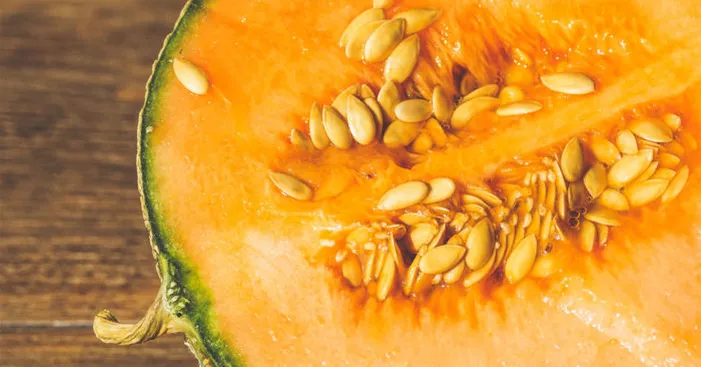
Melon calories provide so many health virtues and they are so refreshing to eat on a hot day.
In this article, we are going to discover melon calories, the health benefits of this fruit, how to consume it, how to buy and store it, and the precautions you need to know before you consume melons regularly.
But first, let’s know some:
General facts about melons:
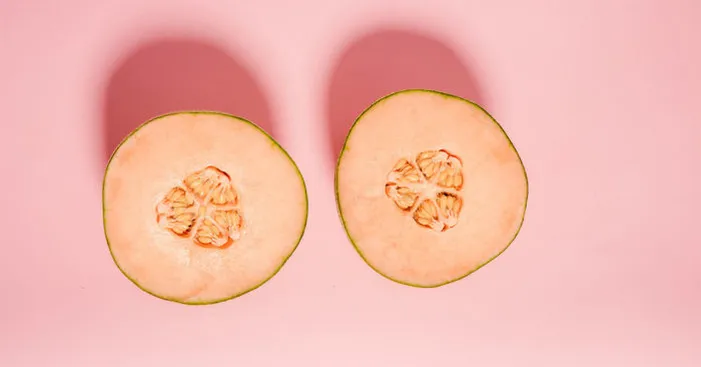
2500 BC, ancient Egyptians were the first ones who cultivated melons and watermelons.
Melons are an annual herbaceous plant with long stems and in the same family as cucumbers.
People started cultivating melons because of their tasty, fragrant, and sweet fruits.
The fruit of a melon plant is usually large with an oval or round shape with a smooth, ribbed, and bumpy skin.
Generally, the color of melon can vary from green to yellow depending on the type and ripening.
Once you open a melon, there is a central cavity inside full of seeds related to fibers.
Melon calories:
These are the melon calories in 1 wedge (140g) of fresh melon:
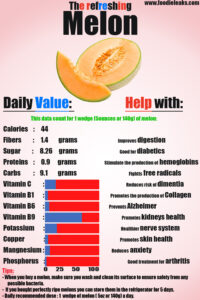
- Calories: 44
- Fibers: 1.4g
- Proteins: 0.9g
- Carbs: 9.1g
- Sugar: 8.26g
- C vitamin: 20%
- B1 vitamin: 5.6%
- B6 vitamin: 8%
- B9 vitamin: 68%
- Potassium: 22%
- Copper: 6%
- Magnesium: 9%
- Phosphorus: 3%
A good source of beta-carotene:
Cantaloup or yellow melon is one of the greatest sources of beta-carotene just like carrots.
This nutrient is a type of carotenoid responsible for the color of the fruit and adds to its antioxidant properties.
In fact, when we ingest beta-carotene it transforms into vitamin A in the body which helps fight free radicals.
Also, vitamin A is essential for the wellbeing of our eyes and the immune system, and the production of hemoglobin.
Rich in folate (vitamin B9):
Just a wedge of melon provides our body with more than 18% of its daily need in vitamin B9.
Among the many roles of this vitamin, it reduces the risk of cancer, fights dementia and Alzheimer’s.
In addition, it protects the fetus from birth defects which is why pregnant women are advised to get 400 to 600 mcg of B9 per day.
A great source of vitamin C:
Most people think that orange skin is the richest in vitamin C and even linked vitamin C with the image of an orange.
However, according to the USDA, a wedge of melon provides more than 80% of our daily need in vitamin C.
This vitamin is responsible for many health functions including the production of collagen and the wellbeing of muscles and blood vessels.
Many scientific studies indicate that a high intake of vitamin C reduces the risk of catching a cold.
Full of water:
Melons are among the foods that are the richest in the water alongside oranges and bell pepper.
In fact, just one wedge (slice) is made of more than 80% water and that provides 50% of our daily need in water.
Consuming melons more often will help our bodies stay moisturized and hydrated.
Once you hydrate your body the heart functions normally the kidneys work properly and the digestion becomes smooth.
Most people know the severity of dehydration but sometimes we forget that it could lead to:
- Muscle pain.
- Vertigo.
- Dryness of the skin.
- Lack of urination and getting rid of toxins.
- Constipation.
Those were the light symptoms of dehydration, but when it gets complicated it could lead to:
- Confusion.
- Fainting
- Low blood pressure.
- High heart rate.
Full of potassium:
One serving of melon provides about 10% of the daily need in potassium.
This mineral is essential to maintain the balance of fluids in the body which act favorably on all body functions.
Also, potassium plays a key role in promoting a healthier nerve system which may enhance cognitive abilities.
Other minerals and vitamins:
The long list of melon nutrients includes also:
- Protein.
- Vitamin K.
- Vitamin B3 (Niacin).
- Cacium.
- Zinc.
- Phosphorus.
- Magnesium.
Health benefits of melon calories:

May prevent cancer:
Thanks to its high content in beta-carotene and vitamin A, melons can be very beneficial to prevent cancer.
For instance, vitamin A is one of the strongest antioxidants and is linked to a reduction of many cancers.
In addition, thanks to the many nutrients in melon it provides great resistance against free radicals which are the source of cancer.
Great skin health:
Beta-carotene in melon offers a great antioxidant property that stimulates the growth of new cells.
Once you eat melon, you are giving your body better protection against damages related to skin aging.
Also, the many other antioxidants in melon make it a great natural remedy against irritability.
Reduces tension and anxiety:
Melon is a great source of potassium, a mineral that relaxes blood vessels and reduces blood pressure.
As a result, a good blood flow ensures better oxygenation to the brain and thus lowers stress.
Once you consume melon, you’ll have a feeling of relaxation that promotes a healthy life free of anxiety.
Boosts the immune system:
In addition to beta-carotene and plant nutrients in melon which helps fight radicals, it also contains vitamin C.
In fact, a wedge of melon provides more than 40% of our daily need for vitamin C.
This vitamin also helps fight free radicals and repair damaged body tissues.
Also, vitamin C stimulates the production of white blood cells that fight viruses and bacteria such as cold and flu.
A good treatment for arthritis:
The many nutrients in melon including beta-carotene, vitamin A and vitamin C prevent stress on joints and bones.
Usually, chronic inflammation in the joints and bones leads to arthritis.
However, melon provides high antioxidant properties and helps fight infections in the joints, and treats arthritis.
Improves digestion and intestinal health:
Melons contain a good amount of dietary fibers which are essential for good digestion.
In fact, fibers promote a smooth translation of feces in the intestines and prevent constipation.
In addition, thanks to its antioxidant properties, melon also protects the colon and intestines from free radicals, therefore, promote better intestinal health.
Good for diabetics:
Several studies show how melon can help to improve metabolism and insulin resistance.
This means once you eat melon in a moderate amount, it is easier for your body to regulate blood sugar levels.
Consuming melon:
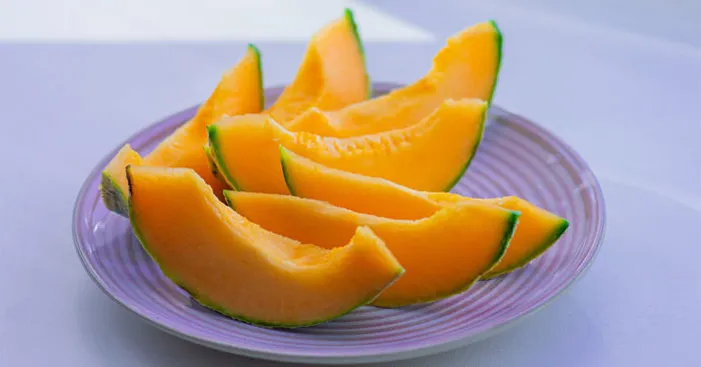
Melons are a very refreshing dessert or snack when they are ripe and sweet you don’t need to add anything to them.
Nonetheless, you can be creative and use them in different ideas:
- In salads: melons combine very well with vegetables and acidic dressing as they soften the flavor.
- Chopped into small cubes and used in cocktails and sangrias.
- In a fruit salad: You can use a melon baller to create small melon balls and add them to the side of your fruit salad plate.
- Chopped in cubes or made into small balls, you can also use melon in sorbets and ice creams.
- You can use melon as one of the ingredients in milkshakes, fruit juices, and smoothies.
- As an appetizer: melon and feta brochettes, small cubes or balls of melon, and feta cheese pierced with a toothpick.
- In cold soups.
- Lightly grill melon pieces on a barbecue then drizzle them with honey and fresh yogurt.
Precautions you need to know before you eat melon:

Usually, food allergies have similar symptoms and yes some people have allergies from melons.
Of course, the severity and duration of these types of allergies differ from one person to the other.
In fact, it can last for a couple of minutes and may remain for hours and symptoms include:
- Hives.
- Itching.
- Coughing.
- Swelling of the tongue and mouth.
There are a certain group of people who should take more precautions before eating melon, among which:
People who want to lose weight:
If you are on a high-calorie diet and not exercising or consuming more calories than you burn, melon won’t help lose weight.
People with kidney problems:
Due to the high level of potassium in melons, they can cause complications for people with kidney issues.
This is because potassium plays a key role in regulating fluids in the body and directly affects the kidneys.
People with blood pressure issues:
Even though melons are a good natural solution to regulate blood pressure, eating too much can be harmful.
Eating a lot of melon may risk raising blood pressure.
Thus, if you deal with blood pressure issues make sure you consult your doctor before you eat melon.
People with diabetes:
Just a wedge of melon provides about 5% of the daily need in sugar which may raise blood sugar levels.
Even though this is safe for most people, it may jeopardize blood sugar levels for diabetic people.
That could result in several symptoms including abdominal pain, shortness of breath, nausea…
Because of that, if you are on diabetes medication make sure you consult your doctor before you eat melon.
Pregnant and breastfeeding women:
Generally, melons are safe for pregnant or breastfeeding women and may offer great health benefits.
However, due to the sensitivity of a woman’s body during pregnancy or when breastfeeding, it is best to consult the doctor before consuming melons regularly.
Buying melon:

When you are purchasing melons, there is some luck involved in that since you can’t open them.
However, there are few tips you can use to pick the best ripe melon:
- Usually, ripe melons have a visible crack at the stem.
- Pick a melon that is heavy in proportion to its size.
- It shouldn’t have a strong smell around the stem because that means the melon is almost rotten.
- Press on the end of the melon on the opposite side of the stem, if it’s hard then the melon is not fully ripe, if it’s too soft that means it’s too ripe and if it is tender enough to feel just a softness then it’s perfectly ripe and ready for consumption.
When you buy a melon, make sure you wash and clean its surface to ensure safety from any possible bacteria.
Storing melon:
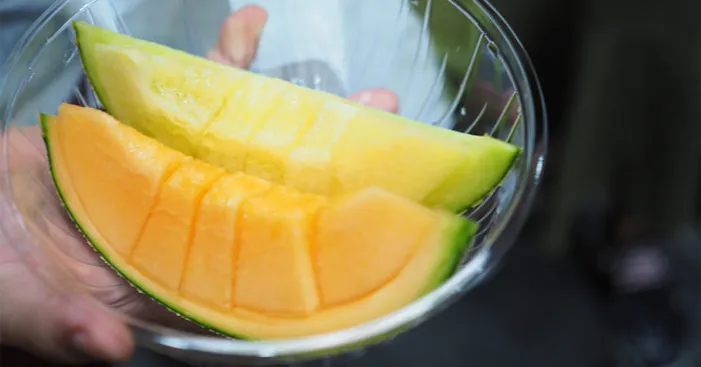
It is not a problem if you bought a half-ripe melon as it continues the ripening process even after purchase.
Thus, we can keep them outside for a couple of days after purchase until they are fully ripe.
However, if you bought perfectly ripe melons you can store them in the refrigerator for 5 days.
Although, once you open the melon, make sure you cover it with plastic foil and not keep it for more than 2 days in the refrigerator.
